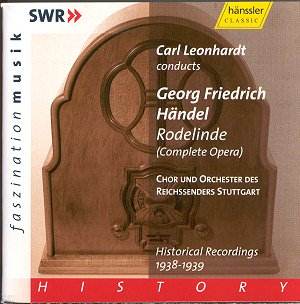It is not often that I copy texts from
the record label’s web site in a review, but this recording is an extreme
case. Read what Hänssler says about this set:
"Historically informed performance
aficionados take note: this is NOT an "authentic" recreation
of a Baroque opera but is instead a fascinating and invaluable document
of how one of the most highly creative musical minds of the Post-War
years envisioned one of Händel's greatest operas as living
art in his time. … This recording, is above all Oskar Hagen's unique
vision of Händel's opera. It is both a simplification (in terms
of plot) with an added focus on the character of Rodelinde – resulting
in a fascinating hybrid of a 20th century opera with its roots in the
18th century."
Things are clear, now. This is not a
complete recording in any sense, nor is it even slightly authentic.
Nevertheless, this recording has some very interesting elements. First,
it represents a historical document of how Handel’s music was performed
some seventy years ago. One might be surprised to hear just how little
difference there is in the overall approach, both musically and vocally,
between this period and the present. Sure, the instruments are different;
the opera is sung in German translation; but the vocal approach is not
very far from many current treatments of the work.
Soprano Cäcilie Reich is very good
in her portrayal of Rodelinda. Her voice is clear and full of emotion
- and this comes across in this remastering of old 78-rpm records. She
shines in some of her arias, and the orchestra stays demurely in the
background to allow her to do so. Hans Ducrue is a bit less convincing
as Garibald, but he suffers from some plodding orchestral backup in
some of his arias. All in all, this is a satisfying performance, for
those who appreciate historical recordings.
The suite from Alcina is less successful.
The density of the strings overcomes any hopes of restoring realistic
sound from the 78s. There is nothing but strings in this suite (at least
nothing else can be heard), and there is no depth, no texture. There
is little reason to include this work, other than to fill up two discs.
The two arias from Julius Caesar, sung
by soprano Marta Fuchs, are a bit too Wagnerian for my tastes, as is
the aria from Radamisto, sung by tenor Georg A. Walter.
This set is interesting, from a historical
point of view, and features an attractive soprano singing Rodelinda.
The remainder of the set is filler, though it may interest those who
collect historic recordings. It should be noted that the sound quality
is excellent, though flat - the clean-up procedure certainly got rid
of hisses and clicks, but took away a bit of the depth as well.
Kirk McElhearn
